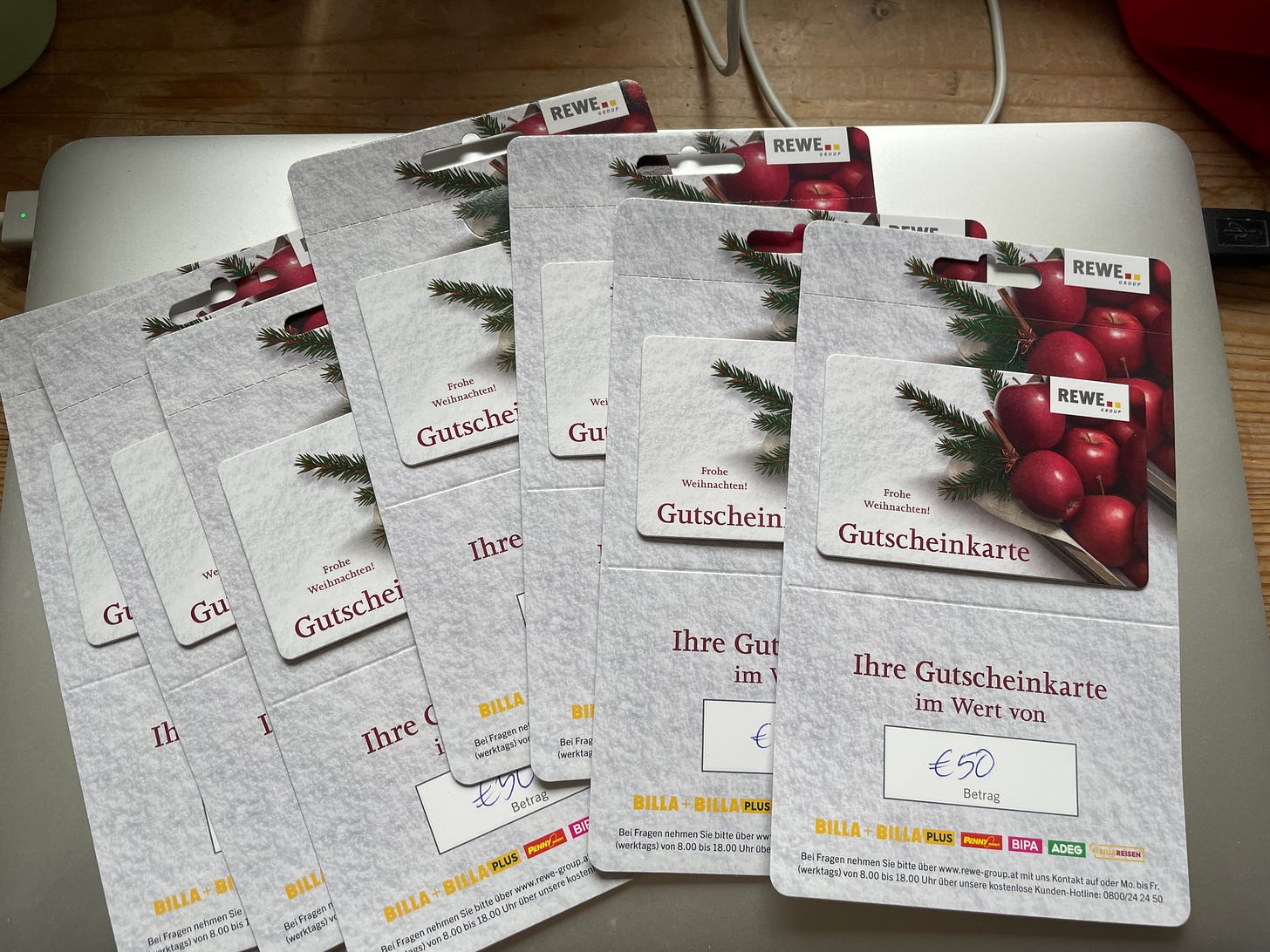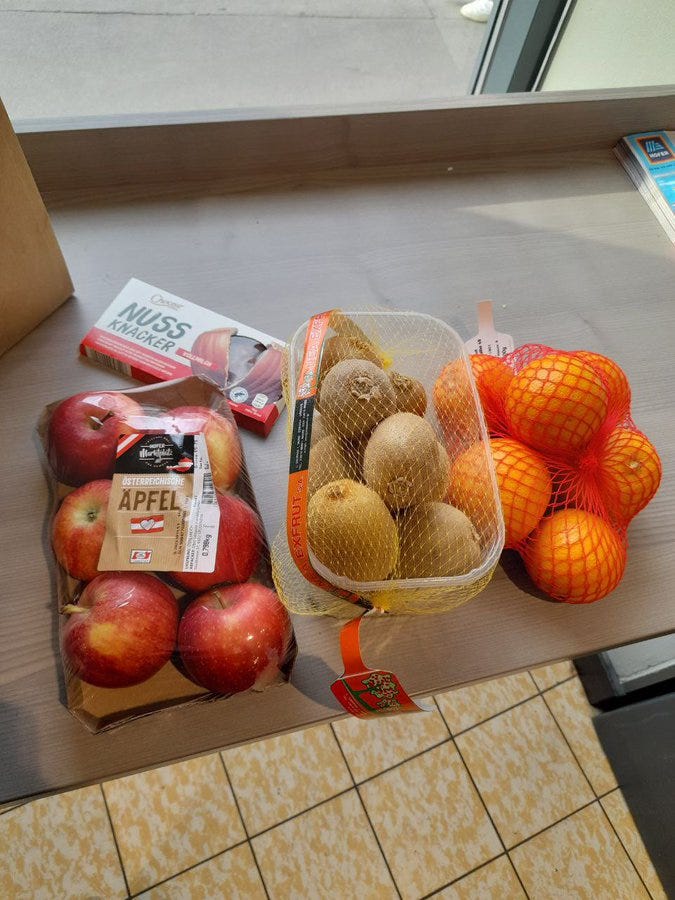
I bought seven more cards this morning and now we have exhausted nearly all of the book & bake sale funds. It was a big week last week, with dozens of cards going out between the funds we raised at the sale and several generous donors who donated 10+ cards each via email (online gift card purchases are a wonderful new addition as all I have to do is print them out). I expect, and I hope the Ukrainians will not disappoint me, a very nice selection of grocery photos this week!
We were also invited to a 50th birthday party this weekend for which the couple asked their guests to donate to one of two charities in lieu of gifts. We will also have a couple dozen more €50 supermarket gift cards from that celebration. So incredibly generous, and I am so grateful, as the more cards you deliver, the more requests you receive, as Ukrainians tell their neighbours, friends, the lady sitting next to them at German class…that is, after all, how our little grapevine works. It makes things manageable in a way that the flow of requests on my iPhone is steady rather an an overnight flood which I would not be able to cope with. And our website still has a long waiting list; I took 55 addresses off of it last week, but still only a drop in the bucket. 99% of Ukrainians are extremely grateful and patient when I cannot answer the question “how long will we have to wait to receive a card”.
I would like to start by sharing with you some big picture news which I have been reading, when I have time, because it puts the situation here on the ground in context for me. In general, I am left with the feeling that we have a huge amount of foreign language reporting on the military situation on the ground in Ukraine, and very little about the dire economic consequences of the war on Ukraine’s civilian population.
To understand how things look on the battlefield, in the context of Zelensky’s weekend tour of Europe (Rome, Berlin, a meeting with Macron, hugs in UK with Sunak), I would recommend reading Phillip O’Brien’s Weekend Update #28 and Mick Ryan’s The Battle of Bakhmut. Whether or not Ukraine’s long expected counteroffensive has really started (or not) is not really the point. The point is, from everything I have been reading, that few expect this war to be over tomorrow, next month, or even this year. The word I keep coming back to is “long”. And then I think to all the Ukrainians I have met recently in Vienna’s arrival center, who are not so much fleeing missiles (that too, of course), but rather a lack of economic opportunity in Ukraine. Husbands have lost jobs. The women may still have their jobs, but their salaries have been slashed. They come to Europe, middle aged, not fully informed, hardworking, convinced it will not be too challenging to find paid work here, despite not speaking German or English in many cases. They do not fully grasp how the legal labor market works here. TL:DR — getting a job, even one paying a low wage requiring manual labor, is not that easy, and if you do get one, you risk losing your housing provided by the state, assuming you were given housing in the context of Grundversorgung, which is very hard to come by now in cities and larger towns, as the federal states seem to have totally slowed down if not fully stopped making rooms available to refugees from Ukraine.
I would like to read more reporting about the economic situation in Ukraine, and what the world can do to ensure that more Ukrainians can stay in “safer” parts of Ukraine until the war is over. Surely this would cost a fraction of supporting Ukrainians in European countries to which not all are suited to adapting to a new life. I recommend reading Tim Mak’s recent report from Kyiv about a fallen soldier’s mother’s battle to receive compensation for her son’s death, as he died shortly after returning home, not on the battlefield. I know a Ukrainian family in Austria who are victims of war crimes (the father was murdered by the Russians when their Kyiv region village was under occupation in March 2022). His widow fought to receive compensation in Ukraine, and faced bureaucratic hurdles, was told papers were filed “too late” etc. There is an entire family with serious medical needs, two of whom are in wheelchairs, who are now asking volunteers for help to get back to Ukraine. I think about all the people I have met along the way these past months who are in no way really equipped to manage an independent life abroad. And yet some surely well-meaning volunteer in Ukraine suggested Europe, and here they are, alone in often fairly dire conditions.

On Saturday, I delivered a few cards to the arrival center, which by the way, will stop accepting new arrivals after May 20. After that day, new arrivals will be instructed to go to a temporary hostel in Vienna’s 13th district, where yet another NGO will be on site. But the police will not be there, which means 24/7 there will be a place refugees can go to request a place to sleep, but they will have to go to another federal building in a different district of Vienna to register their arrival with the police. I really could not tell you why every six months the procedure and location has to change, other than it seems those planning (and with this government, I hesitate to suggest anyone is planning anything at this point) are expecting the flow of refugees to slow to a stop.
It becomes a chicken and egg question though. If Ukrainians arrive, as they do now, in Austria, and do not receive housing quickly, then word gets back to Ukraine that Austria isn’t really open anymore, at least not unless you have a place to live. And housing prices, at least in Vienna, and I expect it is similar across the country, are going through the roof. Everyone is looking for the elusive affordable room to rent in a shared apartment or dorm, or tiny 1-room apartment, and there is simply very limited supply. Plus, landlords normally ask for three months rent as deposit, and three months of payslips. An impossible hurdle for most refugees. We no longer have a situation like March 2022 when ordinary local families opened their doors and took in Ukrainians. That was never going to be a long-term solution. That is all coming to a head now, of course, as many Ukrainians have told me recently they will need to move soon, and have no idea how they will find new housing they can actually afford.
So in this context, I would love to hear more about international economic aid packages to Ukraine, because intuitively it should cost a fraction of the cost of helping house and feed Ukrainians in Europe. I would also expect, if we in Europe expect a long war with no resolution anytime soon (I personally think this is a fair assumption), that the individual nations be upfront about whether or not they can truly house and provide social benefits to additional Ukrainians seeking temporary protection. I would be a wealthy woman if I had a penny for every time a Ukrainian said to me “if Austria is actually closed, why doesn’t it say that it is?”.
This, although from February 2023, I believe it still very much accurate, and describes the challenges of providing aid within Ukraine. International NGOs are not the right bodies for distribution, and local work is done on a micro level. Which is why I think, personally, it would be smarter to shift the conversation away from aid (which is surely needed by vulnerable groups like pensioners and handicapped) towards job preservation and creation. This is another article, also from February, which illustrates perfectly how the majority of International funds go towards security and military aid. Direct humanitarian assistance was only 5% of the total spend. Interestingly, if you look at the bottom chart, you will see Austria is actually providing only humanitarian aid, as it does not engage in military assistance. But objectively speaking, we know what Austrian NGOs and the state have offered is only a drop in the bucket.
Of course there can be no real talk of reconstruction or economic recovery until there is an end to the war in sight, and I cannot say with confidence that I see it. Putin’s Russia seems to have quietly accepted more years of economic pain and men being sent to their senseless deaths by a state that does not value the lives of its citizens. Those unwilling to accept this reality have left or are leaving. Those who have the means to do so, of course.
I have this persistent feeling of unease, and the one thing I genuinely can say with 100% certainty is that I have no idea what to expect going forward. Lukashenko apparently made his last public appearance on May 9, and has not been seen since, sparking all sort of rumours about his health and whereabouts. Two separate Russian acquaintances joked yesterday about their country’s soon-to-be-completed takeover of Belarus. That would be quite a shock should Poland, Latvia, and Lithuania wake up and suddenly have a new border with Russia, and Ukraine would have the Russian army, at least in theory, along its entire northern border. I am no expert, but it seems like one of the only factors preventing a de facto Russian takeover of Belarus was Lukashenko himself.
There is an event in Vienna tomorrow about Ukraine “Time to Decide Europe Summit 2023” hosted by Erste Stiftung. It is free to register for and has a rather interesting list of speakers.
I have also been working on a small project for one of my children’s classes to spend a morning with Ukrainian students their own age (12-13) and offer German conversation practice and do a fun activity together during the last week of school. I always forget when I have these “lightbulb” spontaneous ideas how much time and planning needs to go into the logistics to make what sounds like a great idea an actual reality. This is why my main project is grocery cards. It is relatively easy, straightforward, and produces an immediate, tangible result. On the other hand, one will never know what works and what doesn’t if one never tries anything new.
That's it for today. Thank you for your continued support and interest.




